Forum sheds light on education in future
Writer: Yu Yuanfan | Editor: Liu Minxia | From: | Updated: 2023-12-04

Experts from home and abroad pose for a group photo at the 2023 Yidan Education Forum in the Qianhai International Talent Hub on Nov. 25. Photos courtesy of organizers
What kind of impact will rapid-developing technologies represented by artificial intelligence (AI) have on education? What will education be like in the future? On Nov. 25, experts from home and abroad from academia, the publishing sector, the art scene, the writing scene and other fields shared their insights on the future of education with a full room of attendees at the 2023 Yidan Education Forum in the Qianhai International Talent Hub.
A sideline event of this year’s Shenzhen Reading Month, the forum was co-organized by the Chen Yidan Foundation, the Faculty of Education of Beijing Normal University, and the SDX Joint Publishing Co.
In his opening speech, Dr. Charles Chen Yidan, founder of the Chen Yidan Foundation and core founder of the Shenzhen-based internet and technology company Tencent, pointed out that education should be inherently future-oriented, and in the future, with more possibilities brought by new technology advances, education will become as natural as breathing.
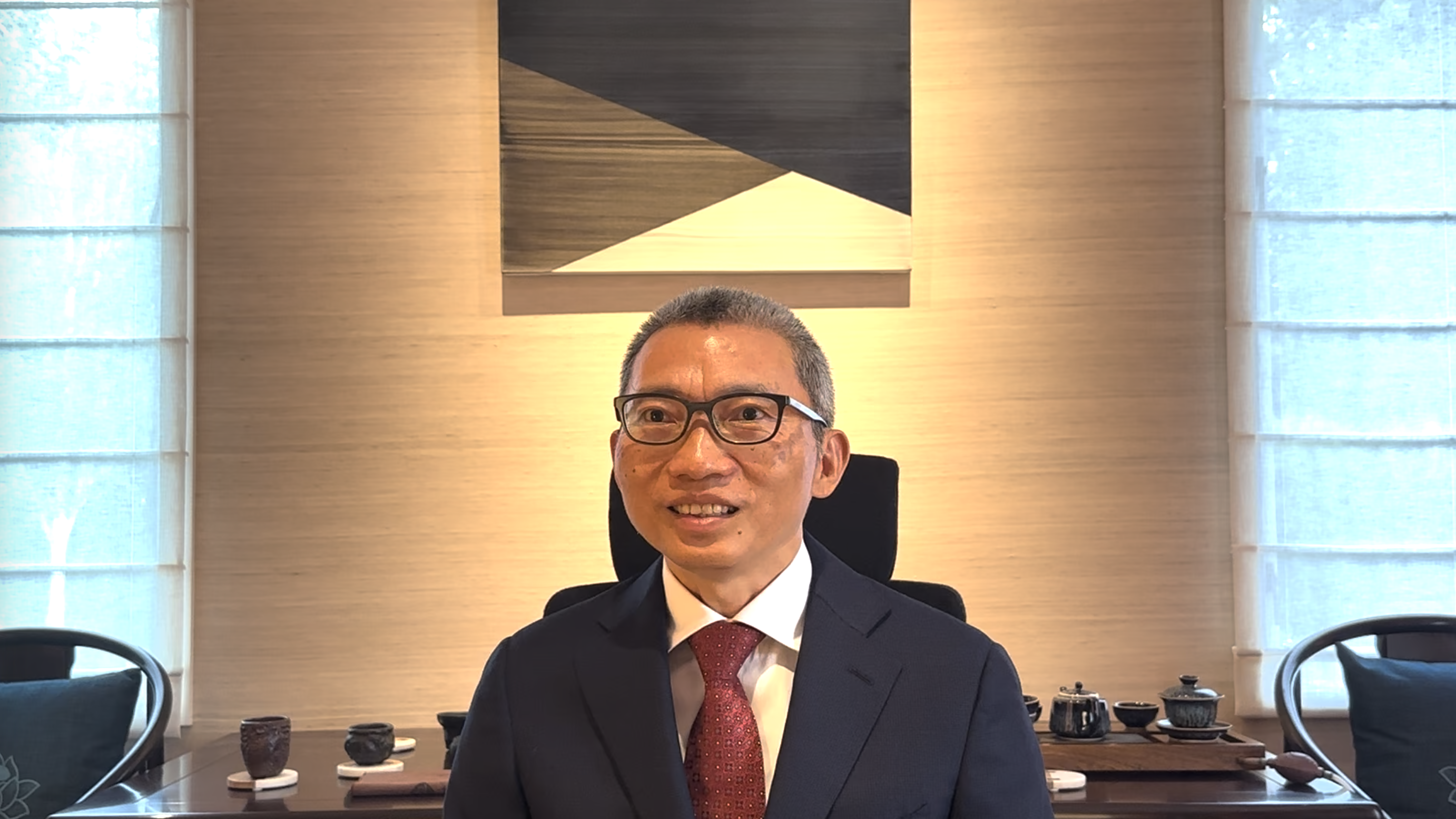
Dr. Charles Chen Yidan, founder of the Chen Yidan Foundation and core founder of the Shenzhen-based internet and technology company Tencent, delivers an opening speech at the forum.
He summarized that the modern technologies have brought and may continue to bring drastic changes to different aspects of education, such as education goals, education contents, education subjects and education scenarios, adding that while it is essential for the education sector to collaborate with industries and keep an eye on emerging trends in innovation and technology, in such an era characterized by technological advancement, education should pay more attention to humanities and prepare young people for engaging in lifelong self-education.
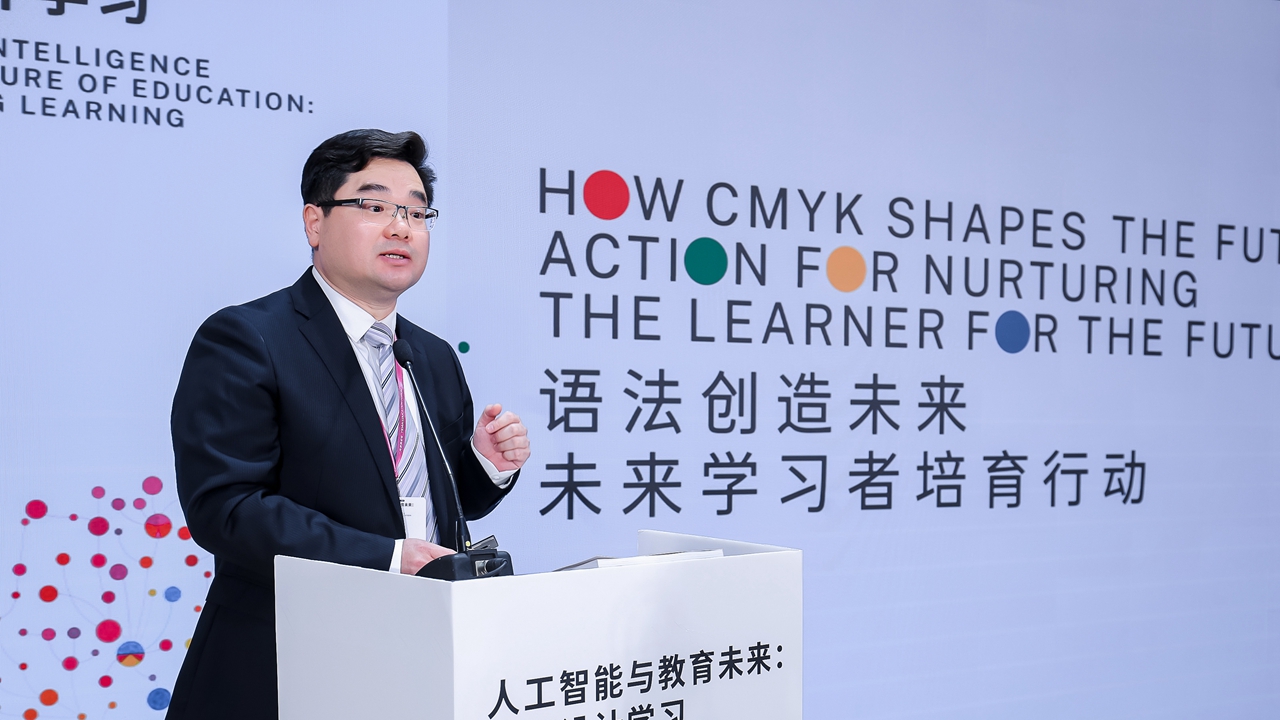
Wang Chen, vice dean and professor of the faculty of education of Beijing Normal University, releases the keynote report "How CMYK Shapes the Future: Action for Nurturing the Learner for the Future.”
Themed “Artificial Intelligence and the Future of Education: Redesigning Learning,” this year’s Yidan Education Forum encompassed a keynote forum titled “Future-oriented Education Ecosystem: Learning and Learners in the Age of Artificial Intelligence,” which saw the release of the forum’s keynote report “How CMYK Shapes the Future: Action for Nurturing the Learner for the Future,” by a team led by Wang Chen, vice dean and professor of the faculty of education of Beijing Normal University, and three sub-forums.
Faced with the profound changes in our lives which are the results of new technologies, humanistic activities such as reading and art should not be overlooked but instead should be given more emphasis, as they play a pivotal role in boosting individuals’ creative thinking. In the first sub-forum, guests including designer, writer, researchers and publishing industry insiders shared with the audience their observations, experiences and research findings, providing valuable insights on the role of humanities in the era of technologies.

An attendee raises a question during one of the forums.
Among the diverse approaches that help children learn, playful learning, an approach the Chen Yidan Foundation also advocates, has been highly prized by both educationists and educators. The second sub-forum, began with a LEGO brick building session hosted by Bo Stjerne Thomsen, vice president of the LEGO Foundation and chair of the foundation’s Learning through Play, introduced to the guests the benefits playful learning and hands-on experience can bring to children, and shared several successful cases in this regard.
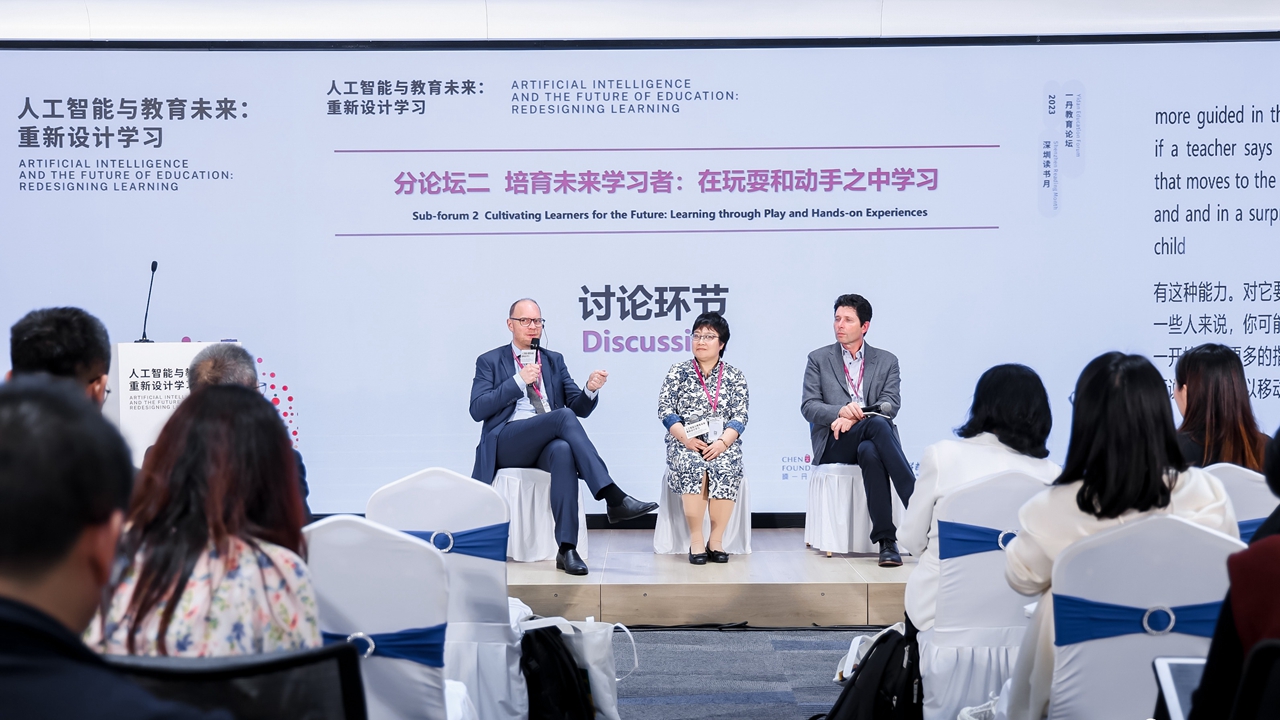
Guests speak at the second sub-forum, which focused on learning through play and hands-on experiences.
In his speech, Mike Petrich, co-founder of the Tinkering Studio at the Exploratorium in San Francisco, the United States, shared about what a relatively mature playful learning program is like by taking the Tinkering Studio as an example, and discussed from which aspects he and his colleagues assess if activities in the program is successful.
When asked in an interview if they have plans to establish similar studios in China or introduce tinkering programs to China, Petrich told the journalists that they look forward to collaborating with partners worldwide to help to inspire and learn from each other, and that they are currently discussing with partners such as the Chen Yidan Foundation about potential projects.
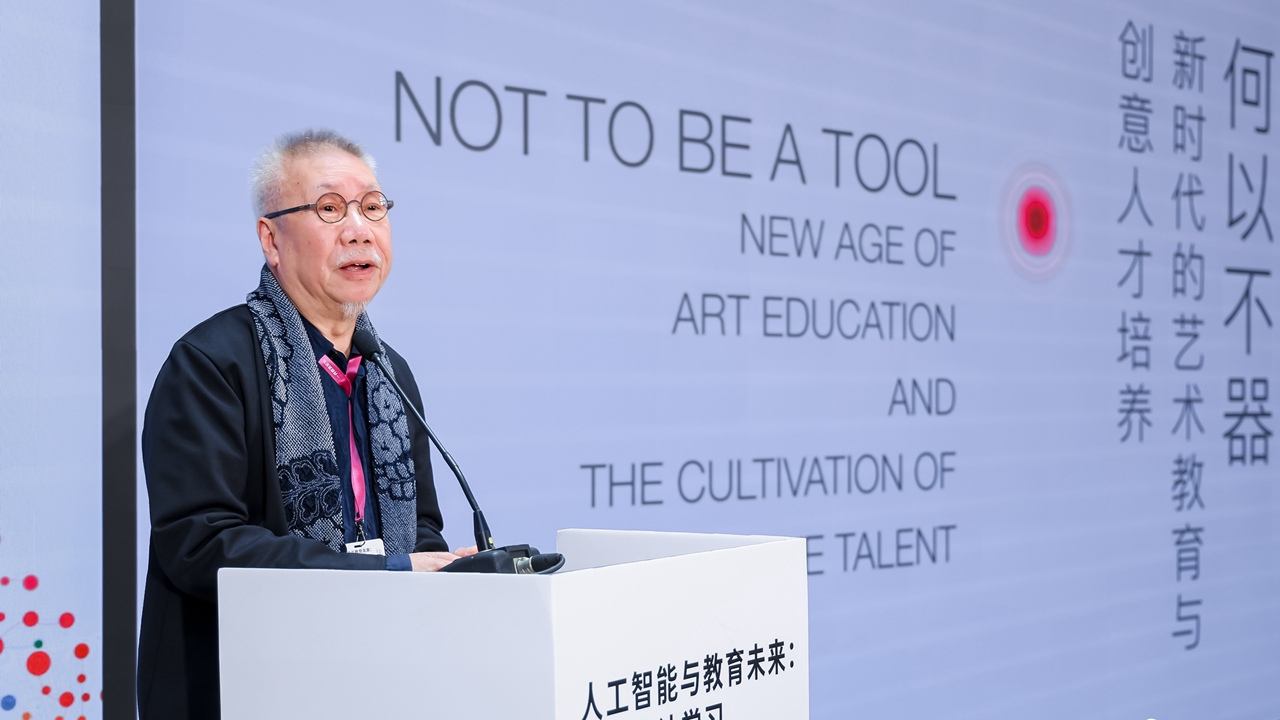
Kan Tai-keung, a famoust artist and an active design educator, gives a speech during the event.
How are technologies impacting education, how does art inspire children’s creativity and social participation, and what are other possibilities of what education can be like? In the third sub-forum, researchers and art museum, art project curators shared from their perspectives how technologies and art can be leveraged to facilitate education.
In an interview with the journalists, Dr. Carey Jewitt, professor of technology and learning at the UCL Knowledge Lab under the University College London’s Department of Culture, Communication and Media, shared her views on the increasing prevalence of students using AI in their studies. According to her, AI, like other technologies, changes how people interact and communicate and shapes how people think, act, imagine and learn. She believes that students should not be punished for embracing new technologies, and it is the job of educators to help them to use technologies in a productive way and incorporate technologies into their thinking.
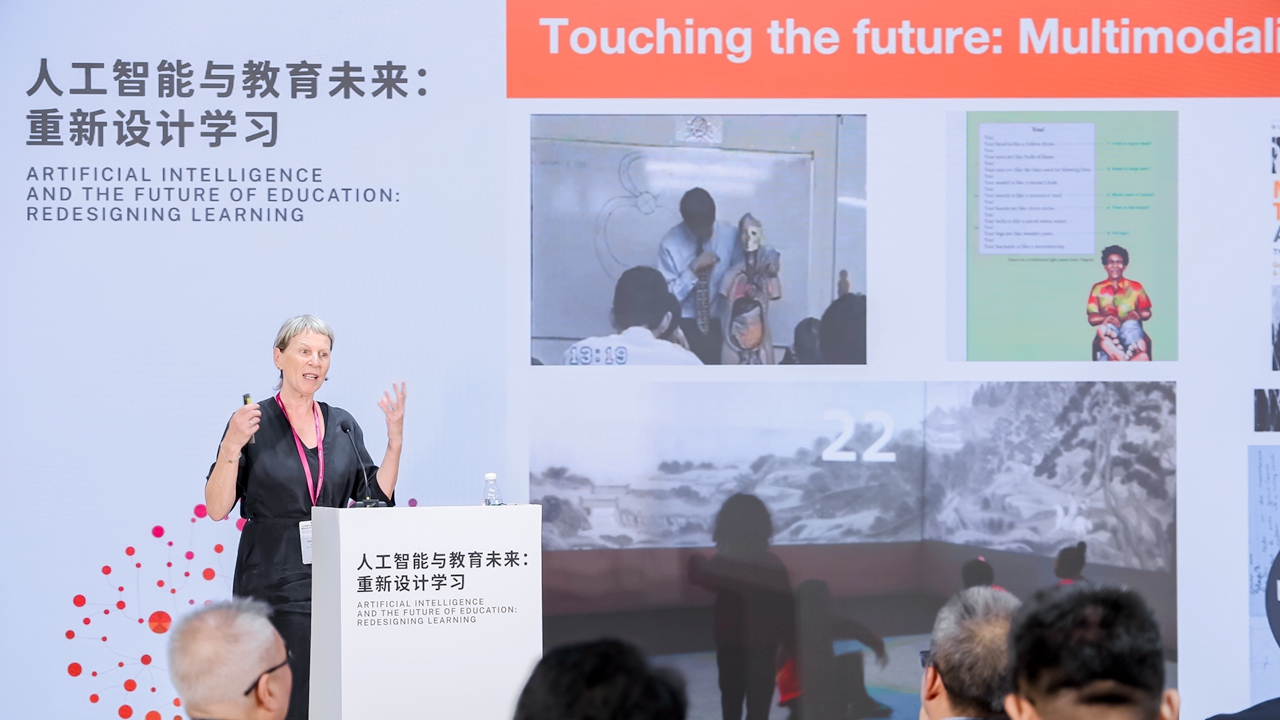
Dr. Carey Jewitt, professor of technology and learning at the UCL Knowledge Lab under the University College London’s Department of Culture, Communication and Media, gives a speech at the forum.
The event also saw the launch of two books, “Competence and Education of the Learner for the Future” and “Making Learning More Enjoyable: Learning Through Play in China,” jointly published by the Chen Yidan Foundation, the China Publishing Group Co. Ltd., and the World Publishing Corporation.
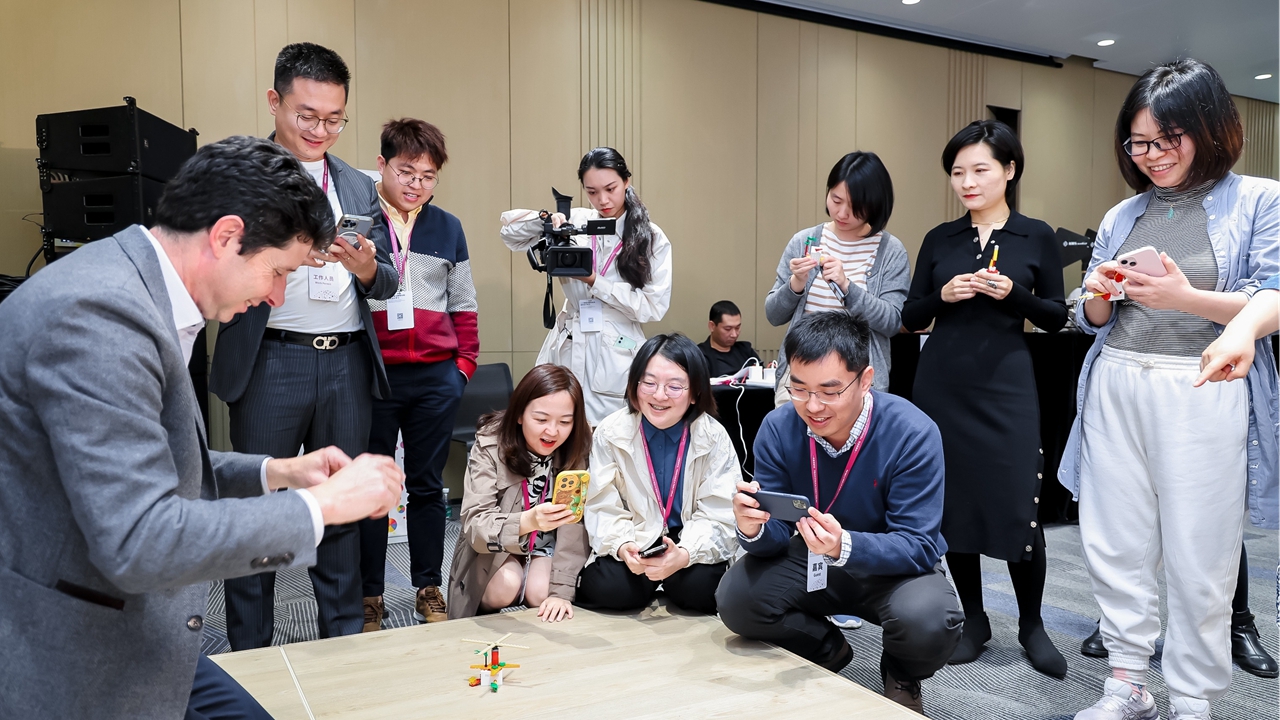
Attendees try to learn through play and hands-on experience during an interactive session of the event.
Hosted by the Chen Yidan Foundation since 2020, the annual Yidan Education Forum is an international platform for educationists and education practitionersto exchange ideas on topics centering on innovation in education.
Keynote speakers and guests of the event’s four editions came from over 60 countries and regions as well as international organizations such as the United Nations Educational, Scientific and Cultural Organization (UNESCO), the Organization for Economic Co-operation and Development (OECD), Asian Development Bank, the Yidan Prize Foundation, and the Lego Foundation.